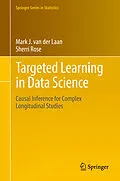This textbook for graduate students in statistics, data science, and public health deals with the practical challenges that come with big, complex, and dynamic data. It presents a scientific roadmap to translate real-world data science applications into formal statistical estimation problems by using the general template of targeted maximum likelihood estimators. These targeted machine learning algorithms estimate quantities of interest while still providing valid inference. Targeted learning methods within data science area critical component for solving scientific problems in the modern age. The techniques can answer complex questions including optimal rules for assigning treatment based on longitudinal data with time-dependent confounding, as well as other estimands in dependent data structures, such as networks. Included in Targeted Learning in Data Science are demonstrations with soft ware packages and real data sets that present a case that targeted learning is crucial for the next generation of statisticians and data scientists. Th is book is a sequel to the first textbook on machine learning for causal inference, Targeted Learning, published in 2011.
Mark van der Laan, PhD, is Jiann-Ping Hsu/Karl E. Peace Professor of Biostatistics and Statistics at UC Berkeley. His research interests include statistical methods in genomics, survival analysis, censored data, machine learning, semiparametric models, causal inference, and targeted learning. Dr. van der Laan received the 2004 Mortimer Spiegelman Award, the 2005 Van Dantzig Award, the 2005 COPSS Snedecor Award, the 2005 COPSS Presidential Award, and has graduated over 40 PhD students in biostatistics and statistics.
Sherri Rose, PhD, is Associate Professor of Health Care Policy (Biostatistics) at Harvard Medical School. Her work is centered on developing and integrating innovative statistical approaches to advance human health. Dr. Rose's methodological research focuses on nonparametric machine learning for causal inference and prediction. She co-leads the Health Policy Data Science Lab and currently serves as an associate editor for the Journal of the American Statistical Association and Biostatistics.
Autorentext
Mark van der Laan, PhD, is Jiann-Ping Hsu/Karl E. Peace Professor of Biostatistics and Statistics at UC Berkeley. His research interests include statistical methods in genomics, survival analysis, censored data, machine learning, semiparametric models, causal inference, and targeted learning. His applied research involves applications in HIV and safety analysis, among others. He has published over 250 journal articles, 4 books, and one handbook on big data. Dr. van der Laan is also co-founder and co-editor of the International Journal of Biostatistics and the Journal of Causal Inference and associate editor of a variety of journals. Dr. van der Laan received the 2004 Mortimer Spiegelman Award, the 2005 Van Dantzig Award, the 2005 COPSS Snedecor Award, the 2005 COPSS Presidential Award, and has graduated over 40 PhD students in biostatistics or statistics.
Sherri Rose, PhD, is Associate Professor of Health Care Policy (Biostatistics) at Harvard Medical School. Her work is centered on developing and integrating innovative statistical approaches to advance human health. Dr. Rose's methodological research focuses on nonparametric machine learning for causal inference and prediction. She has made major contributions to the development and application of targeted learning estimators, as well as adaptations to super learning for varied scientific problems. Within health policy, Dr. Rose works on comparative effectiveness research, health program impact evaluation, and computational health economics. She co-leads the Health Policy Data Science Lab and currently serves as an associate editor for the Journal of the American Statistical Association and Biostatistics.
Inhalt
Part I: Introductory Chapters
1. The Statistical Estimation Problem in Complex Longitudinal Data
- Data Science and Statistical Estimation
- Roadmap for Causal Effect Estimation
- Role of Targeted Learning in Data Science
- Observed Data
- Caussal Model and Causal target Quantity
- Statistical Model
- Statistical Target Parameter
- Statistical Estimation Problem
- Structural Causal Models
- Causal Graphs / DAGs
- Nonparametric Structural Equation Models
3. Super Learner for Longitudinal Problems
- Ensemble Learning
- Sequential Regression
4. Longitudinal Targeted Maximum Likelihood Estimation (LTMLE)
- Step-by-Step Demonstration of LTMLE
- Statistical Properties
- Theoretical Background
6. Why LTMLE?
- Landscape of Other Estimators
- Comparison of Statistical Properties
Part II: Additional Core Topics
7. One-Step TMLE
- General Framework
- Theoretical Results
- Demonstration for Effect Among the Treated
- Simulation Studies
9. Online Targeted Learning
- Batched Streaming Data
- Online and One-Step Estimator
- Theoretical Considerations
10. Networks
- General Statistical Framework
- Causal Model for Network Da
11. Application to Networks
- Differing Network Structures
- Realistic Network Examples (e.g., effect of vaccination)
- R Package Implementation of TMLE
12. Targeted Estimation of the Nuisance Parameter
- Asymptotic Linearity
- IPW
- TMLE
13. Sensitivity Analyses
- General Nonparametric Approach to Sensitivity Analysis
- Measurement Error
- Unmeasured Confounding
- Informative Missingness of the Outcome
- FDA Meta-Analysis
Part III: Randomized Trials
14. Community Randomized Trials for Small Samples
- Introduction of SEARCH Community Rando
15. Sample Average Treatment Effect in a CRT
- Introduction of the Parameter
- Effect for the Observed Communities
- Inference
16. Application to Clinical Trial Survival Data
- Introduction of the Survival Parameter
- Censoring
- Treatment-Specific Survival Function
- Effect of Pandora Streaming on Music Sales
- Application of TMLE
18. Causal Effect Transported Across Sites
- Intent-to-Treat ATE
- Complier ATE
- Incomplete Data
- Moving to Opportunity Trial
Part IV: Observational Longitudinal Data
19. Super Learning in the ICU
- ICU Prediction Problem
- Super Learning Algorithm
- Defining Stochastic Interventions
- Dependence on True Treatment Mechanisms
- Continuous Exposure
- Air Pollution Data Example
21. Stochastic M…
